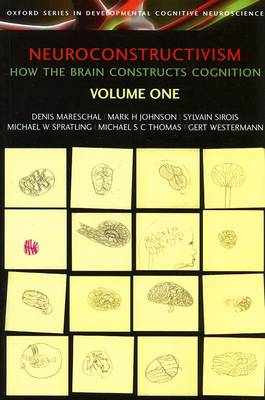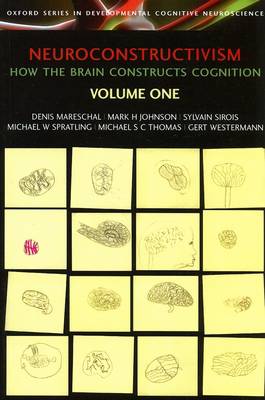
Door een staking bij bpost kan je online bestelling op dit moment iets langer onderweg zijn dan voorzien. Dringend iets nodig? Onze winkels ontvangen jou met open armen!
- Afhalen na 1 uur in een winkel met voorraad
- Gratis thuislevering in België vanaf € 30
- Ruim aanbod met 7 miljoen producten
Door een staking bij bpost kan je online bestelling op dit moment iets langer onderweg zijn dan voorzien. Dringend iets nodig? Onze winkels ontvangen jou met open armen!
- Afhalen na 1 uur in een winkel met voorraad
- Gratis thuislevering in België vanaf € 30
- Ruim aanbod met 7 miljoen producten
Zoeken
Neuroconstructivism Volume One
How the Brain Constructs Cognition
Denis Mareschal, Mark Johnson, Sylvain Sirois, Michael Spratling, Michael Thomas, Gert Westermann
€ 96,45
+ 192 punten
Omschrijving
What are the processes, from conception to adulthood, that enable a single cell to grow into a sentient adult? They are so complex that any attempt to understand development necessitates a multi-disciplinary approach, integrating data from cognitive studies, computational modeling, and neuroimagingan approach until now seldom taken when considering child development. Neuroconstructivism is a major two-volume work that seeks to redress this balance, presenting an integrative new framework for considering development. In Volume One, the authors review up-to-date findings from neurobiology, brain imaging, child development, as well computer and robotic modeling to consider why children's thinking develops the way it does, and propose a new synthesis of development that is based on five key principles found to operate at many different levels of description. Their Neuroconstructivist framework also shows how developmental disorders, such as dyslexia, can arise from typical
developmental processes operating under atypical constraints. Of central importance to Neuroconstructivism is the idea that computer and robotic models are vital tools for investigating the processes and mechanisms involved in learning and development. Volume Two illustrates the principles of Neuroconstructivist development through contributions from nine different labs across the world.
developmental processes operating under atypical constraints. Of central importance to Neuroconstructivism is the idea that computer and robotic models are vital tools for investigating the processes and mechanisms involved in learning and development. Volume Two illustrates the principles of Neuroconstructivist development through contributions from nine different labs across the world.
Specificaties
Betrokkenen
- Auteur(s):
- Uitgeverij:
Inhoud
- Aantal bladzijden:
- 288
- Taal:
- Engels
- Reeks:
Eigenschappen
- Productcode (EAN):
- 9780198529910
- Verschijningsdatum:
- 15/03/2007
- Uitvoering:
- Paperback
- Formaat:
- Trade paperback (VS)
- Afmetingen:
- 231 mm x 155 mm
- Gewicht:
- 433 g

Alleen bij Standaard Boekhandel
+ 192 punten op je klantenkaart van Standaard Boekhandel
Beoordelingen
We publiceren alleen reviews die voldoen aan de voorwaarden voor reviews. Bekijk onze voorwaarden voor reviews.











